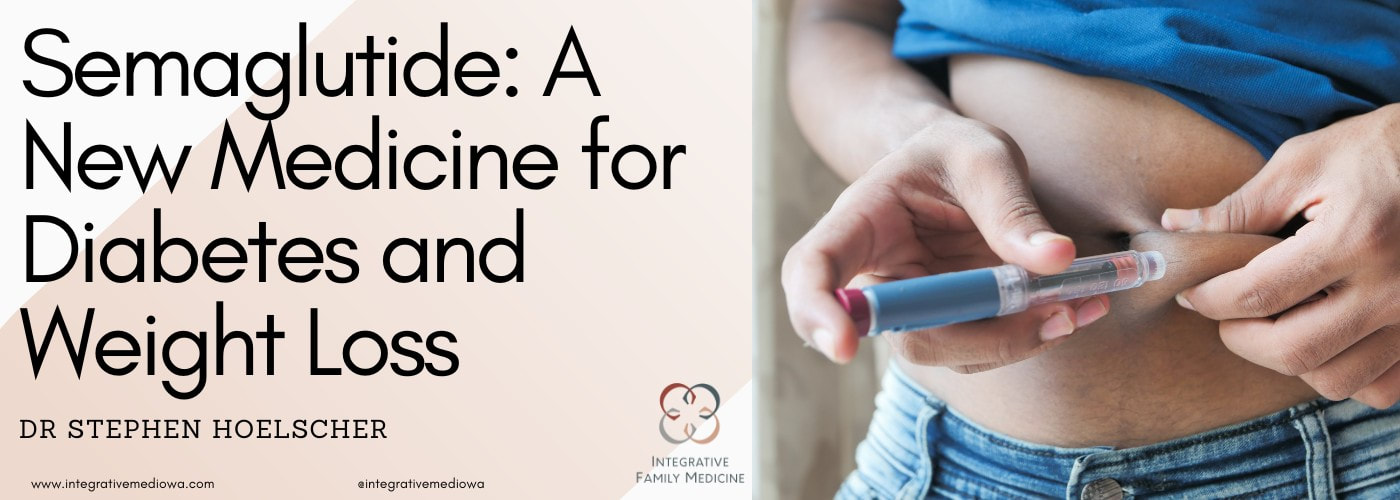|
Semaglutide is a medication that helps control blood sugar levels and is used in the treatment of type 2 diabetes. In a previous article, we discussed the general characteristics of semaglutide, how it works, the benefits and risks of using it. In this article, we will discuss the outcomes of studies on semaglutide, and how it can improve health outcomes. Effect on Diabetes and Weight. Semaglutide has been shown to reduce the average blood sugar level over a period of three months, which is measured by hemoglobin A1c. It has also been found to reduce weight across multiple studies. However, we will focus more on the other risk reductions provided by semaglutide. Effect on Cardiovascular Disease People with diabetes have an increased risk of cardiovascular disease and, therefore, are at risk for a heart attack. Studies have shown that semaglutide can help lower this risk. In a study conducted by Marso et al, the first occurrence of death from cardiovascular causes was reduced by 26% in those who took semaglutide versus those who did not. A similar result was seen when they compared the difference in the same outcome when comparing oral use of semaglutide versus placebo. The risk was lowered by 21% in this study. These studies showed that, while not perfect, controlling diabetes with semaglutide did improve primary cardiovascular event risks. The occurrence of these events still occurring in those that were taking the medicine shows the complexity of this disease and that there is more to it than just controlling diabetes and/or weight as this medicine also showed a reduction in patient’s weight. Effect on Cholesterol and Triglyceride Levels Semaglutide has also been found to improve cholesterol and triglyceride levels, which are part of metabolic syndrome. Metabolic syndrome is a condition that consists of weight gain, diabetes, high blood pressure, and high cholesterol. Studies have shown that semaglutide can help reduce free fatty acids, VLDL, LDL (bad) cholesterol, and triglycerides compared to other diabetes treatments. It also demonstrated a reduction in blood pressure overall. By improving blood sugar control, reducing one’s weight, reducing LDL (bad) cholesterol and triglycerides, as well as improving one’s blood pressure, the treatment of metabolic syndrome as a whole improves and the overall risk that that diagnosis carries goes down as evidenced by the cardiovascular outcomes above. Studies on Semaglutide The evidence provided in this article is a sample size of studies that have occurred and are occurring to study semaglutide in greater detail to see how truly effective it is against these kinds of diseases. It is very reassuring thus far, and it is a general rule that if various other studies show consistency with their outcomes, then this medicine is truly doing these kinds of things to the human body, which is fantastic news as diabetes, obesity, poor cholesterol control, hypertension, and vascular disease, among other illnesses, have plagued our society for far too long. Conclusion In conclusion, semaglutide is a significant contributor to helping people get their lives back on track. Although it is not the only answer to diabetes, obesity, poor cholesterol control, hypertension, and vascular disease, it has been found to provide promising results in controlling these conditions. We encourage readers to read the cited articles and to discuss with their providers in order to put anything they have questions about in context, as these studies are not perfect, and the data coming from them is realistic meaning that not every single thing we want to be better is going to be better. Dr Stephen Hoelscherwww.integrativemediowa.com/stephen.html References
0 Comments
If you're looking for a new medicine that can help you with diabetes and weight loss, you may want to consider semaglutide. This medicine belongs to a class of drugs called GLP-1 agonists, which are used to stimulate cellular receptors in your body. Semaglutide is a natural hormone that's produced by your body after eating a meal. It increases insulin production and sensitivity of insulin receptors, which helps regulate your blood sugar. It also acts on your stomach and brain to slow down your digestive system and reduce your appetite. Semaglutide is one of several GLP-1 agonists that are used to manage diabetes. However, semaglutide has also been found to be effective for weight loss and reducing the incidence of cardiovascular and cerebrovascular diseases. It comes in three different brands, including Ozempic and Wegovy, which are injectable, and Rybelsus, which is taken by mouth. Injectables tend to be more effective than oral medications because they are not subject to first-pass metabolism, which can reduce the efficacy of the drugs. Semaglutide is particularly effective at promoting weight loss. Clinical studies have shown that people taking this medication have lost at least 10% of their initial body weight. This is because the drug reduces hunger levels, which leads to smaller portions and fewer calories consumed. The drug also improves insulin resistance, which helps regulate blood sugar and reduces the risk of developing cardiovascular and cerebrovascular diseases. The most common side effects of semaglutide are nausea and constipation. These side effects are also common with other GLP-1 agonist drugs. Semaglutide is not recommended for people with a personal history of pancreatitis, MEN-1 syndrome or medullary thyroid carcinoma, or a history of recurrent gallbladder disease. One issue with semaglutide is that it may not be covered by insurance if you're using it for weight loss without a history of diabetes. However, the drug is widely covered for people with diabetes or insulin resistance. Other supporting diagnoses may also qualify for coverage, but this can be complicated. Semaglutide is a powerful tool for achieving ideal health. It not only improves diabetes and weight loss, but it can also lead to improvements in high blood pressure, high cholesterol, sleep apnea, joint disease, fatty liver disease, and depression, as well as other psychological illnesses. This medication can help you improve your diet, energy levels, and health habits, leading to a transformation in your body both externally and internally. In conclusion, semaglutide is a promising new drug that can help you with diabetes and weight loss. If you're interested in learning more about it, talk to your doctor to see if it's right for you. Dr Stephen Hoelscherhttps://www.integrativemediowa.com/stephen.html References.1. Sorli C, Harashima SI, Tsoukas GM, Unger J, Karsbøl JD, Hansen T, et al.. Efficacy and safety of once-weekly semaglutide monotherapy versus placebo in patients with type 2 diabetes (SUSTAIN 1): a double-blind, randomised, placebo-controlled, parallel-group, multinational, multicentre phase 3a trial. Lancet Diabetes Endocrinol (2017) 5:251–60. 10.1016/S2213-8587(17)30013-X [PubMed] [CrossRef] [Google Scholar]
2. Ahrén B, Masmiquel L, Kumar H, Sargin M, Karsbøl JD, Jacobsen SH, et al.. Efficacy and safety of once-weekly semaglutide versus once-daily sitagliptin as an add-on to metformin, thiazolidinediones, or both, in patients with type 2 diabetes (SUSTAIN 2): a 56-week, double-blind, phase 3a, randomised trial. Lancet Diabetes Endocrinol (2017) 5:341–54. 10.1016/S2213-8587(17)30092-X [PubMed] [CrossRef] [Google Scholar] 3. Ahmann AJ, Capehorn M, Charpentier G, Dotta F, Henkel E, Lingvay I, et al.. Efficacy and safety of once-weekly semaglutide versus exenatide ER in subjects with type 2 diabetes (SUSTAIN 3): a 56-week, open-label, randomized clinical trial. Diabetes Care (2018) 41:258–66. 10.2337/dc17-0417 [PubMed] [CrossRef] [Google Scholar] 4. Aroda VR, Bain SC, Cariou B, Piletič M, Rose L, Axelsen M, et al.. Efficacy and safety of once-weekly semaglutide versus once-daily insulin glargine as add-on to metformin (with or without sulfonylureas) in insulin-naive patients with type 2 diabetes (SUSTAIN 4): a randomised, open-label, parallel-group, multicentre, multinational, phase 3a trial. Lancet Diabetes Endocrinol (2017) 5:355–66. 10.1016/S2213-8587(17)30085-2 [PubMed] [CrossRef] [Google Scholar] 5. Rodbard HW, Lingvay I, Reed J, de la Rosa R, Rose L, Sugimoto D, et al.. Semaglutide added to basal insulin in type 2 diabetes (SUSTAIN 5): a randomized, controlled trial. J Clin Endocrinol Metab (2018) 103:2291–301. 10.1210/jc.2018-00070 [PMC free article] [PubMed] [CrossRef] [Google Scholar] 6. Marso SP, Bain SC, Consoli A, Eliaschewitz FG, Jódar E, Leiter LA, et al.. Semaglutide and cardiovascular outcomes in patients with type 2 diabetes. N Engl J Med (2016) 375:1834–44. 10.1056/NEJMoa1607141 [PubMed] [CrossRef] [Google Scholar] 7. Pratley RE, Aroda VR, Lingvay I, Lüdemann J, Andreassen C, Navarria A, et al.. Semaglutide versus dulaglutide once weekly in patients with type 2 diabetes (SUSTAIN 7): a randomised, open-label, phase 3b trial. Lancet Diabetes Endocrinol (2018) 6:275–86. 10.1016/S2213-8587(18)30024-X [PubMed] [CrossRef] [Google Scholar] 8. Lingvay I, Catarig AM, Frias JP, Kumar H, Lausvig NL, le Roux CW, et al.. Efficacy and safety of once-weekly semaglutide versus daily canagliflozin as add-on to metformin in patients with type 2 diabetes (SUSTAIN 8): a double-blind, phase 3b, randomised controlled trial. Lancet Diabetes Endocrinol (2019) 7:834–44. 10.1016/S2213-8587(19)30311-0 [PubMed] [CrossRef] [Google Scholar] 9. Zinman B, Bhosekar V, Busch R, Holst I, Ludvik B, Thielke D, et al.. Semaglutide once weekly as add-on to SGLT-2 inhibitor therapy in type 2 diabetes (SUSTAIN 9): a randomised, placebo-controlled trial. Lancet Diabetes Endocrinol (2019) 7:356–67. 10.1016/S2213-8587(19)30066-X [PubMed] [CrossRef] [Google Scholar] 10. Capehorn MS, Catarig AM, Furberg JK, Janez A, Price HC, Tadayon S, et al.. Efficacy and safety of once-weekly semaglutide 1.0 mg vs once-daily liraglutide 1.2 mg as add-on to 1-3 oral antidiabetic drugs in subjects with type 2 diabetes (SUSTAIN 10). Diabetes Metab (2020) 46:100. 10.1016/j.diabet.2019.101117 [PubMed] [CrossRef] [Google Scholar] 11. Zinman B, Aroda VR, Buse JB, Cariou B, Harris SB, Hoff ST, et al.. Efficacy, safety and tolerability of oral semaglutide versus placebo added to insulin ± metformin in patients with type 2 diabetes: the PIONEER 8 trial. Diabetes Care (2019) 42:2262–71. 10.2337/dc19-0898 [PMC free article] [PubMed] [CrossRef] [Google Scholar] What does appetite mean exactly? We like to think of it in terms of a desire for food. But it is actually more properly termed as the power that tends us toward some object that we see as good which acts through the body. Even if the object is bad for us, we can still seek it under the notion of the apparent good (this is where we have mistakenly assessed it as good). For instance, we all know appetite in relation to food but this word can apply to many things, like a tendency toward hard work or pleasure of some kind. Thankfully, we are focusing on food and drink so we don’t have to worry about those other things.
There are two types to go over – the concupiscible and the irascible. The concupiscible appetite is a tendency toward a good or away from an evil in a simple sense whereas the irascible appetite comes when one has to overcome some obstacle to satisfy the concupiscible appetite. We have inclinations that impel us toward things that are hard or difficult to attain (arduous) like completing your degree or building something. These appetites are moved by our senses, imagination, association power and intellect. To illustrate these points, let me give an example using myself. I have an appetite (concupiscible) for chips and salsa. If I see chips and salsa, my appetite is moved (I tend towards eating them because they taste good!). Here my senses moved the appetite (I saw and smelled them while tasting them will further move it). If I think about them without them present (with my imagination, memory, intellect, association power), then I will move my appetite still. My body chemistry actually changes in response to this movement. The irascible appetite is aroused if I have to drive a long distance to get them (an obstacle I have to overcome). I might exhibit an annoyance that I have to drive to get this but this emotion drives me to overcome that long drive. Both appetites will have their respective emotions or passions which is what we will move to next. The six passions of the concupiscible appetite include: love, hate, desire, flight, delight and sorrow. Love drives all of the others. The five passions of irascible appetite include: hope, despair, audacity, fear, and anger. What I will attempt to do is to try to relate these passions or emotions to what we eat and drink. Love, as part of the concupiscible appetite, is a movement toward a good or pleasant object. For example, the chips and salsa. If the chips and salsa are here and attainable, then the love for it generates an actual desire. Once I obtain the chips and salsa, the desire comes to fruition in joy and delight. But if some other thing impedes that attainment, then the irascible passion of anger (irritation, annoyance, etc) will be stirred up against this impediment and urge us to overcome it. Once it is out of the way, joy or delight returns. The same can be said to avoid evil things (which is moved by a love for the good and in this instance, avoiding evil is good). For example, let’s say I gain more knowledge that eating too many chips and salsa is bad for my health and so now my object of love is my body’s well-being. However, I find eating broccoli and other healthy foods difficult to eat. Love for my health moves me to desire to eat better though. However, the impediment to this is my attachment to chips and salsa. In other words, my love for the pleasure that chips and salsa brings me when I eat it. Hence, because this is arduous, an irascible passion will now arise. Which comes depends on the person and where they are at with dealing with this arduous task. One person may have hope where he hopes in his or another’s capacity to get him to come to the good (eating healthier and ridding himself of his attachment to chips and salsa). Another person may despair where he thinks there is no way he will ever get over this addiction as he does not see it as possible to obtain. This happens because he sees the object of being healthier exceeding his capacity to obtain it. If and when the person does overcome this arduous task, he returns to delight as he has obtained masterful control of his attachment. Of course, true mastery is difficult to get so he can fall back into eating chips and salsa without moderation which then elicits anger as the evil of his addiction has returned and is present. This anger, though, helps one move back towards overcoming this attachment. If is overcome again, one goes back to delight and if not, one can move towards sorrow or depression (because the present evil of this attachment to chips and salsa is still here). Of course, with aid, one can be moved back to hope and eventually joy/delight. You can see the complexity that the human mind and brain contains. Multiple emotions can come from each emotion in this process – I only illustrated a few. These emotions move through us so quickly that we never think about it. But to gain mastery over yourself in this way, you should try to understand these kinds of emotions better! If you know how you respond well to such impediments, then we can begin to draw out the reasons why you may think you cannot overcome the arduous task of overcoming a certain attachment to a certain bad food. If you know that you despair when thinking about losing weight to achieve a healthier state, why is that? Why do you despair? What makes you think that you cannot overcome the hard task of avoiding bad foods and eating good foods? By asking yourself these questions, you are exercising your capabilities of reasoning out what the problem is and finding a solution to overcome that problem and give yourself hope again. By giving yourself hope again, you will then begin to be moved to overcome this hard task. The point I want to make is that we need to rightly order our passions of both appetites so that we can make good choices. Remember that there are instances where it is reasonable to feel fear or despair because when one reasons out that one truly cannot overcome something, then it is reasonable to feel this way. Like desiring to see a parent who recently died but knowing that this is impossible (in this life) since that person is dead so one appropriately can move the passions of sorrow, despair and anger. The key question is: are you truly despairing in a reasonable way with trying to eat healthier? Is it really un-attainable? Or is it that you are letting your appetite for pleasure override what is reasonable? It is reasonable to maintain a healthy balanced diet because that is a true good for your body. Eating outside these boundaries occurs because of a disordered appetite. We must orient ourselves back to controlling our appetites. This will be the subject of a future blog but as a preview, the answer to getting control again is to perform acts that are truly good for you. With regards to your diet, keeping a food journal is a good first step. It keeps you informed of your bad eating habits so that your intellect and will can make more reasonable choices moving forward. By strengthening them through journaling and practice of eating healthier, you begin to take control over your disordered appetites and thus gain more hope that you can indeed overcome this difficult task. |
Blog Info
Archives
June 2024
Categories
All
|
|
Visit our Locations
IFM | West Des Moines 475 S. 50th St., Suite 600 West Des Moines, IA, 50265 *Temporarily Closed* IFM | Ankeny 207 NE Delaware Ave. Suite 20 Ankeny, IA 50021 |
Office HoursMonday 9:00 a.m. - 5:00 p.m. Tuesday 9:00 a.m. - 5:00 p.m. Wednesday 9:00 a.m. - 5:00 p.m. Thursday 9:00 a.m. - 5:00 p.m. Friday by appointment. Sat & Sun Closed |
© 2024 Integrative Family Medicine of Iowa, PLLC.
All rights reserved.
All rights reserved.






 RSS Feed
RSS Feed

